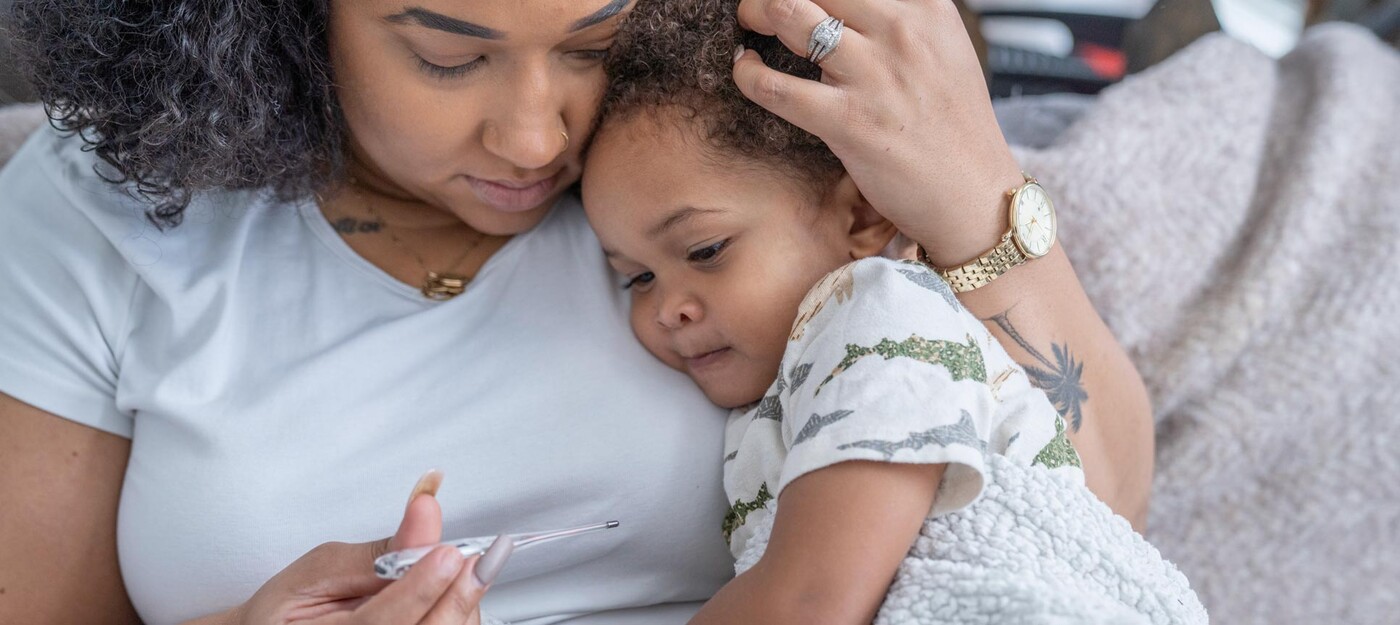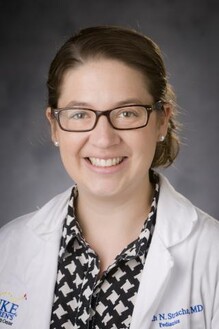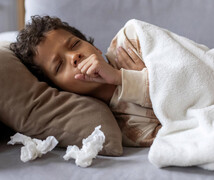If you are concerned that your infant or toddler may have respiratory syncytial virus (RSV), what should you do? “First, don’t panic,” said Elizabeth Erickson, MD, FAAP, a pediatrician at Duke Health. “While we are seeing an increase in the number and severity of RSV cases, most kids who get sick will be just fine.”
Here, Dr. Erickson and Duke pediatric emergency medicine specialist Emily Greenwald, MD, talk about RSV symptoms, how to care for your child at home if they get sick, and when you should seek medical care.
RSV Puts Babies at Risk
According to Dr. Greenwald, RSV is a common respiratory virus that many people over the age of two have already had. The symptoms -- stuffy or runny nose, cough, fever, sore throat, and sneezing -- resemble a cold and typically go away in about week. While the virus can affect both children and adults, children younger than one, particularly premature babies, are at higher risk for developing more severe symptoms like labored breathing. People who are immunocompromised and over the age of 65 may also have a harder time fighting off the virus.
“Children’s airways are a lot smaller than adults’ and fill more quickly with mucus,” Dr. Greenwald explained. “The other issue is that most infants and toddlers drink from a breast or a bottle, and they can’t do that with a stuffy nose.” As babies get dehydrated, their mucus thickens. “It becomes this vicious cycle,” she said. “They can't breathe, so they drink even less.”
Treating RSV Symptoms at Home
Mild RSV symptoms can be managed at home, Dr. Greenwald said. Using a nasal aspirator to suction mucus from your child’s nose is an important part home treatment. “Also, fevers are not dangerous. They are a natural defense against illness, but they can make children breathe faster. Bringing down a fever can make breathing look a lot better.” This can help your child drink and stay hydrated. Symptom management is currently the only effective treatment for RSV, although lab-created proteins called monoclonal antibodies may be given as a vaccine to some high-risk premature infants to help prevent it.
Should Your Child Be Tested for RSV?
While some daycares require RSV testing for re-entry, a positive test won’t necessarily change if and how your baby will be treated. Rather than seek out a test, it’s often better to keep your sick child out of the doctor’s office so they are not around other sick children and are not exposing people who are well. Depending on their symptoms, babies less than four months old, premature babies, and immunocompromised children should be tested for RSV since these children are at highest risk for serious complications, said Dr. Erickson.
When to See a Doctor for RSV
If you are concerned about your child’s symptoms, reach out to your pediatrician’s office. If you are a Duke patient, you can ask questions via My Duke Health (previously Duke MyChart) or request a video visit so your child can be assessed in the comfort of home. “You can also call the 24-hour nurse triage line to see if an appointment is necessary,” said Dr. Erickson.
If your child has breathing problems, pale or bluish skin, difficulty drinking, or hasn’t had a wet diaper in six hours, bring them to the emergency room. “Or if you have called the 24-hour nurse triage line and tried nasal suctioning and treating fever and are still worried, just come in,” said Dr. Greenwald. “We are experts at quickly establishing who needs emergency-level care. We can coach you on care at home and what to be on the lookout for.” If needed, hospitals can provide additional care like oxygen and breathing support.
Protect Your Family from RSV and Other Viruses
Like other viruses including the flu and COVID, RSV spreads through contact with an infected person. That's why washing your hands and limiting contact with sick people is so important. In addition, Dr. Greenwald recommends common-sense precautions like staying home if possible when you or your child is sick, keeping hydrated, and covering coughs and sneezes. Because RSV isn’t the only virus circulating this season, both doctors also strongly encourage eligible people -- those six months of age or older -- to get COVID and flu vaccines.






